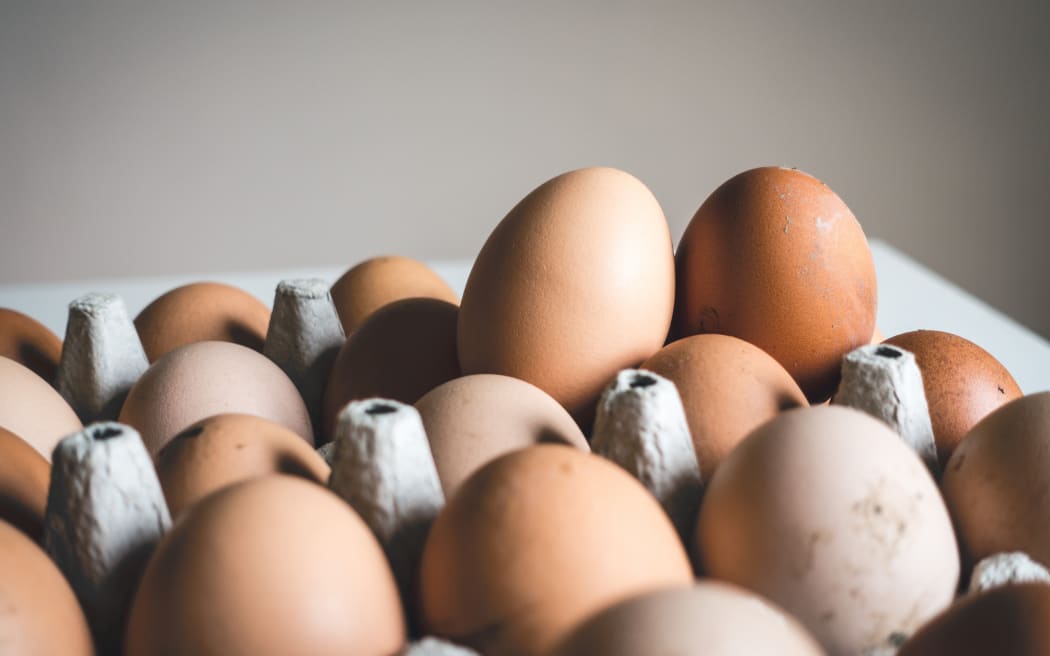As the price of eggs continues to rise, industry reps say they are still playing catch-up following a ban on cage farming, facing higher production costs and building up flock numbers.
Checkpoint has been tracking the price of a dozen barn eggs at a Countdown and PAK'nSAVE in the same suburb since May last year.
A dozen Countdown-branded barn eggs shot up 78 percent, from $5.50 to $9.80. At PAK'nSAVE, they had increased a staggering 168 percent, from $3.91 to $10.49.
At the moment, the price of an egg is hard to stomach. Checkpoint sent some reporters out to their local supermarket to check what the going rate was for a dozen barn eggs.
The winning price was in Dunedin at $7.80, followed closely by Hawke's Bay at $7.90.
Next was Palmerston North at $8.49, Christchurch was $9.30, while Hamilton topped things off at a whopping $10.50.
The price was a huge problem for Bread & Butter cafe and bakery in Auckland's Grey Lynn - they go through 3000 to 4000 eggs a week.
Owner Isobel Pasch said it was getting their hands on the eggs that was the problem.
"Often our regular supplier's out of eggs, or we order eight boxes and we get one. Sometimes, we would order free-range eggs and we would get barn eggs."
When things got desperate, they used packaged egg pulp instead, keeping an emergency stash in their freezer.
"For some products, that's okay... it's not so noticeable there, but for other things, absolutely you can't, like poached eggs."

Photo: Jakub Kapusnak for Unsplash
Since the start of the year, eggs had been in short supply. Egg Producers Federation director Michael Brooks said things were getting better, but it took time - newly hatched hens could only start laying eggs after five months.
The number of egg-laying hens in the commercial market used to be about 4.2 million in 2020, but farmers decreased the number of chicks they ordered when they could not get the price they wanted.
Since January, there were an extra 200,000 in the flock, and the industry was expecting another 300,000 by the end of the year.
"From the low point of about 3.4 million, we're at about 3.6 million. We'll be at 3.9 million, we believe, by the end of the year - so it is increasing bit by bit."
Brooks said the extra supply should decrease prices, but there were other factors at play - like the cost of grain and a weak New Zealand dollar.
"We don't buy grains directly from the Ukraine, but it's such an important player in the world grain market. The shortages from there are having pricing impact on grain prices and then of course in New Zealand, we've been hit by the lowering dollar against the US dollar."
Ten years ago, 84 percent of the industry used battery cages for their hens. But a complete ban on cage farming came into effect at the end of last year.
Brooks said this meant costs were higher for farmers.
"They were the cheapest form of egg, and of course now you've got more expensive production systems - there's a minimum of $1 million, some cases millions of dollars to change. You've got slightly lower production than in a cage system."
Hatching a plan
The high cost of eggs had some people scrambling to buy hens. Trade Me figures showed there were more than 51,000 searches for chickens, feeders and coops in August.
When the egg shortage began in January, there were 65,000 searches in two weeks.
Heritage Poultry chicken breeder Casey Pattern had been trying to keep up with demand ever since.
"My phone rang red hot for about three weeks."
She said a lot of people were already thinking about getting chickens, but the price of eggs was the final push.
"I do think it's really nice to have chickens tootling around in the backyard. If you care for something, then they'll reward you with some eggs at the end of the day, if you're lucky."

